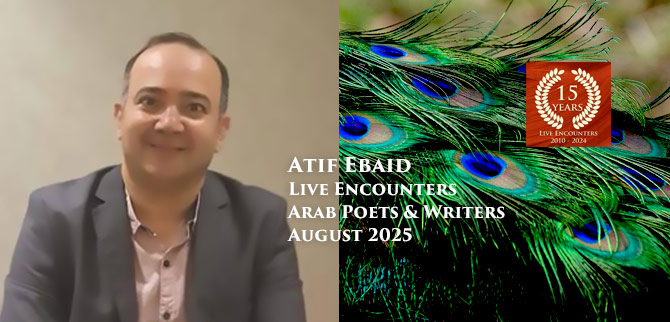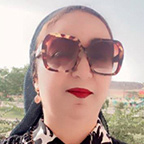
Live Encounters Poetry & Writing August 2025
The Router of the Mayor, story by Ahmed A’id.
Translated from Arabic by Dr. Salwa Gouda.
5,000 sad reacts and 600 comments in less than five minutes flooded the village’s Facebook page after news of Abdelaziz, the mayor ‘s death was posted. Although Facebook doesn’t have a ‘schadenfreude’ reaction, the comments weren’t free from insinuations and jabs at the man’s reputation. Saad al-Tahami wrote: “And before God, adversaries are gathered,” while Umm Shaimaa al-Ghabashi commented: “how long did it last?!” Anyway, the burial was scheduled for tomorrow after Friday prayers at the Grand Mosque in the market. One hour before the call to prayer, the coffin would move toward the mosque, accompanied by the cries of his seven children: Othman and two brothers, along with four daughters, the eldest named Zeinab.
Angry reacts on the death announcement post increased, and more explicit comments accusing him appeared. One minute before the call to prayer, the muezzin announced over the loudspeaker: “Mr. Bakri al-Alwani, in charge of the village Facebook page: Close the comments quickly, Bakri!”
Abdelaziz al-Eisawi was a distinctive farmer in his appearance and dress. It was said his grandfather, al-Eisawi, was the mayor of our village during King Farouk’s time, so people kept calling Abdelaziz ” the mayor “. Abdelaziz always said about himself: “I am a unionist farmer,” and he was quick at any moment to pull out his Farmers’ Union membership card along with a few other party membership cards – some active, others no one had ever heard of.
After the funeral prayer, the coffin moved to the cemetery. As soon as it arrived, the place was packed with a large crowd of mourners, among whom appeared many men from outside the village.
In the evening, the mourning tent blocked three main streets that all converged in front of Abdelaziz’s house in the large courtyard. The entire Eisawi family was at the front of the tent, led by Othman, the deceased’s son. The Quran reciter prepared for a recitation that would be broadcast live on the village page.
The condolence gathering began. Cameras were carefully positioned in the corners of the tent. Behind all this arrangement was Mahmoud al-Eisawi, the son of the mayor ‘s paternal uncle. He worked hard to make the gathering worthy and qualified him to inherit the title of “Engineer of Funerals” within the Eisawi family, a title exclusively held by Abdelaziz himself for twenty years.
The condolence ceremony ended at 10 PM. Mahmoud al-Eisawi approached Othman proudly and whispered in his ear: “We reached 30,000 views for the condolence video on the village Facebook page. Rest assured, we closed the comments, and everything is fine.”
The mayor’s children gathered in the large reception hall after the gathering – three men and four daughters. The talk was about the need to establish an ongoing charity for the deceased’s soul. After much discussion and back-and-forth… the family decided to install a fast router at the entrance to their house. It would offer free internet without a password. Next to the router, on a plastic sign, it was written: “Al-Fatiha [the opening chapter of the Quran] and prayers for the deceased owner of the router.”
People crowded around the free router. Bustle began around the house: girls, young men, students, employees… and passersby slowed their steps near the router, walking slowly. The constant sound of WhatsApp, Messenger, and Facebook notifications around the house became very normal. Even those who put their phones in their pockets found them connecting to the internet as soon as they passed near the mayor ’s house, triggering notifications – vibrating and audible.
The gathering around the house became like a vibrant saint’s festival, lacking only a chanter and swings. The neighbors stopped complaining about the crowds around the mayor’s house because this bustle brought quick prosperity to the surrounding shops, and because the neighbors were also the first to benefit from the free internet.
However, the festival around the router began to take another shape. Neighboring houses started renting out their benches to those who wanted to sit within the router’s range. The rent for a single bench varies depending on its proximity to the free internet. Attiyat al-Ghajariyya set up her tea stall near the spot, then a seller of carrots and lettuce appeared, until it evolved into a morning market for the whole village, selling everything until the afternoon. Then the nature of the crowd changed after the afternoon, filled with university students and employees who returned from work, slept for two hours, then met up in the large country yard, gathered around the router.
The wide area became cramped with the crowds, and the internet speed weakened. Murmurs rose from the people around the router. Then, one dared to knock loudly on the big gate and shouted: “The internet is slow, O sons of the mayor!” From here, the idea of complaining about the weak router developed among the villagers. Even Attiya, son of Umm al-Sa’d (the crazy one), threw a brick towards the iron gate’s glass pane and broke it. Othman, the mayor ‘s son, came out and hit Attiya, then promised to increase the router’s speed, “Not for the sake of Umm al-Sa’d’s son, but so our father may rest peacefully in his grave.” The crowd cheered, and indeed, the internet speed increased, making people happy.
The router’s speed weakened worse than before. Each time, a pane of glass in the iron gate was broken, until the big time came: all the gate’s glass was shattered, and the farmers’ hands reached for the gate’s copper handle. Othman and his brothers came out of the house angrily. A huge crowd gathered around the house with one voice: “The internet is slow, O sons of the mayor!” Othman swore to everyone he wouldn’t renew the internet and would remove the router. The whistling of the boys increased until the district police officer arrived at the mayor s house. He met with Othman and his brothers inside. Zeinab, the mayor ‘s daughter, said:
“We can no longer sleep from all this noise around our father’s router. And we can no longer bear the monthly cost of the internet at this volume.”
The officer replied:
“We are the ones paying for the internet, by agreement with your brother Othman. Your father worked for us as a secret informant, and he wrote us a will stating that he should continue enjoying the pleasure of transmitting village news to us even after his death. So, we thought of installing the router in the large country yard.”
© Atif Ebaid
Atif Ebaid (born June 17, 1969) is an Egyptian publisher and short story writer, holding a doctorate in Cognitive Systems. He has published several short story collections, including Lady Kaf, Khufu Announces His Conversion to Islam, Samawi, and The Router of the Village Chief. Obeid is also a prominent figure in the Egyptian and Arab cultural scene.
 Translated by Dr. Salwa Gouda, who is an accomplished Egyptian literary translator, critic, and academic affiliated with the English Language and Literature Department at Ain Shams University. Holding a PhD in English literature and criticism, Dr. Gouda pursued her education at both Ain Shams University and California State University, San Bernardino. She has authored several academic works, including Lectures in English Poetry and Introduction to Modern Literary Criticism, among others. Dr. Gouda also played a significant role in translating The Arab Encyclopedia for Pioneers, a comprehensive project featuring poets, philosophers, historians, and literary figures, conducted under the auspices of UNESCO. Recently, her poetry translations have been featured in a poetry anthology published by Alien Buddha Press in Arizona, USA. Her work has also appeared in numerous international literary magazines, further solidifying her contributions to the field of literary translation and criticism.
Translated by Dr. Salwa Gouda, who is an accomplished Egyptian literary translator, critic, and academic affiliated with the English Language and Literature Department at Ain Shams University. Holding a PhD in English literature and criticism, Dr. Gouda pursued her education at both Ain Shams University and California State University, San Bernardino. She has authored several academic works, including Lectures in English Poetry and Introduction to Modern Literary Criticism, among others. Dr. Gouda also played a significant role in translating The Arab Encyclopedia for Pioneers, a comprehensive project featuring poets, philosophers, historians, and literary figures, conducted under the auspices of UNESCO. Recently, her poetry translations have been featured in a poetry anthology published by Alien Buddha Press in Arizona, USA. Her work has also appeared in numerous international literary magazines, further solidifying her contributions to the field of literary translation and criticism.

